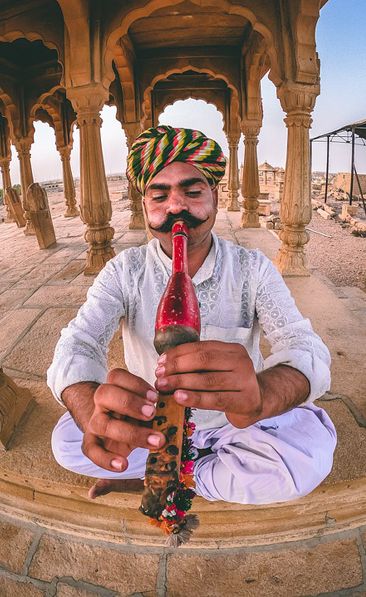How Do I Go About Learning Indian Musical Instruments?
 Most people in the UK who think about learning a musical instrument tend to go straight to one of the standard western instruments, such as guitar, piano or violin. However, there are many other very rich musical traditions, some of which are connected to significant parts of the UK population.
Most people in the UK who think about learning a musical instrument tend to go straight to one of the standard western instruments, such as guitar, piano or violin. However, there are many other very rich musical traditions, some of which are connected to significant parts of the UK population.
Nowhere is this more true than in the vast and ancient musical traditions of the Indian subcontinent, derived from countries like India, Pakistan, Bangladesh and others. Whether you're looking to reconnect with your ancestral heritage, or whether you're just enchanted by some of the world's greatest music, you may decide you want to learn an Indian instrument. But how do you go about it?
What Kind of Music Interests You?
Indian music is by no means of one single type, and it's vital to decide what kind of music you're interested in making. This will determine both your approach and the instrument you choose to take up. There are two distinct traditions of classical music in India — Hindustani music from the north and Carnatic music from the south. Both are largely built around ragas (set music figures that the musicians improvise around), but where Hindustani music focuses largely on instruments, Carnatic music is more vocal-led. In addition, there's a wide range of folk traditions from all parts of the subcontinent. While these have influenced classical music, they tend to be focused on celebrating communal events. If you're interested in folk music, you might want to research your cultural roots to find the appropriate tradition.
Perhaps the most popular type of Indian music today is Bollywood, which uses similar instruments and ragas to classical music, but is aimed more at pure entertainment, whereas the classical traditions aim for enlightenment.
What Instruments Are Available?
There are hundreds of instruments used in Indian music, especially if you look at all the regional folk traditions, but many of these will be difficult to get hold of in the UK, let alone finding someone to teach you. Here are just a few of the most common:
- Stringed instruments — The sitar is by far the most iconic Indian instrument, as far as the west is concerned. It's used in Hindustani music, along with other stringed instruments like the sarod, while Carnatic music uses a family of instruments called veenas. The tambura is an accompanying instrument that produces the characteristic drone behind Indian music.
- Bowed instruments — In addition to the plucked instruments, there are a number of fiddle-type bowed instruments, such as the sarangi, used in both folk and classical music.
- Wind instruments — Indian music has a range of flutes and brass instruments, as well as many reed instruments such as the shehnai, which most closely resembles the oboe.
- Percussion instruments — The tabla, derived from Hindustani music, is the most familiar Indian drum, while Carnatic music has the double-headed mridangam. Many regional folk traditions use various types of dhol, another type of double-headed drum.
- Vocal — Singing is as important in Indian as in western music. If you want to sing authentically in one of the Indian traditions, you'll need training.
How Do I Learn My Instrument?
There are various approaches to learning an Indian instrument, ranging from watching YouTube videos to finding one of the various institutions devoted mostly to classical music. However, the tradition is very much based on the individual teacher-pupil relationship, so finding a private tutor would be ideal. If you're learning an instrument like sitar or tabla, it shouldn't be too difficult to find a reasonable local tutor, depending on where you live. For some of the less-common instruments, however, it might be necessary to have lessons online from someone at a distance — perhaps even from the subcontinent itself. If you don't already have the instrument, it might be as well to find your tutor first, since they may be able to advise you as to your best choice. It's worth bearing in mind, though, that many Indian instruments are quite expensive.
Your best chance of finding the right private tutor for your chosen instrument would be to have as wide a choice as possible. Register with TutorExtra and find out if we have just the right tutor for you.


